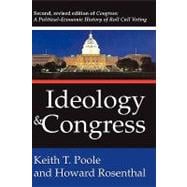
Note: Supplemental materials are not guaranteed with Rental or Used book purchases.
Purchase Benefits
What is included with this book?
| Preface to Congress : a political-economic history of roll call voting (1997) | |
| Introduction : the liberal/conservative structure | p. 1 |
| The spatial model and congressional voting | p. 12 |
| The spatial model : accuracy and dimensionality | p. 32 |
| The spatial model : stability, replacement, and polarization | p. 78 |
| Party realignment in Congress | p. 114 |
| Issues, constituent interests, and the basic space | p. 148 |
| Sophisticated voting and agenda manipulation | p. 192 |
| Roll call voting and interest group ratings | p. 214 |
| Committees and roll calls | p. 239 |
| Abstention from roll call voting | p. 273 |
| The NOMINATE literature | p. 295 |
| The unidimensional Congress | p. 312 |
| Table of Contents provided by Blackwell. All Rights Reserved. |
The New copy of this book will include any supplemental materials advertised. Please check the title of the book to determine if it should include any access cards, study guides, lab manuals, CDs, etc.
The Used, Rental and eBook copies of this book are not guaranteed to include any supplemental materials. Typically, only the book itself is included. This is true even if the title states it includes any access cards, study guides, lab manuals, CDs, etc.